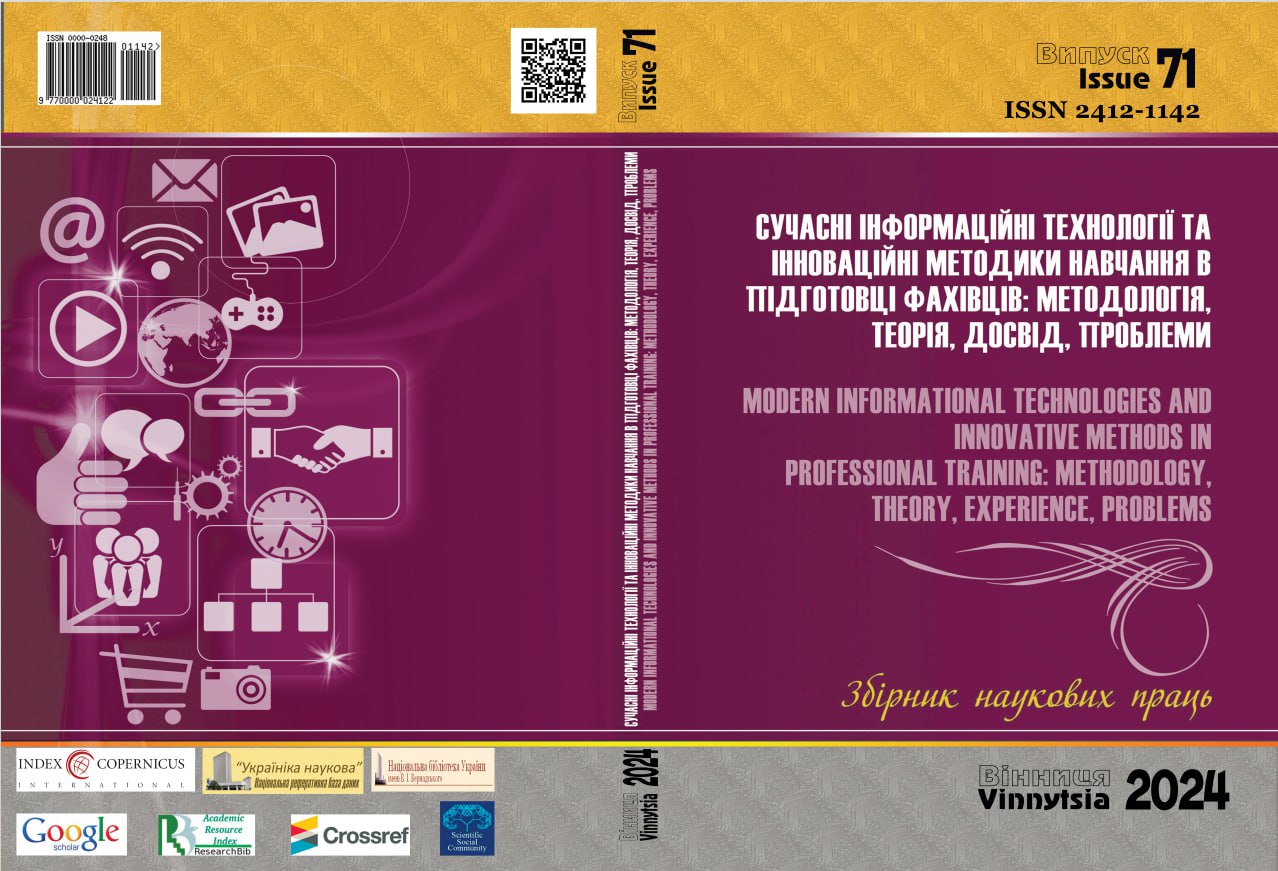DESIGNING PEDAGOGICAL CONDITIONS FOR AESTHETIC EDUCATION OFJUNIOR SCHOOLCHILDREN USING THEATRICAL MEANS AT LITERARY READINGCIRCLE CLASSES
DOI:
https://doi.org/10.31652/Keywords:
pedagogical conditions, aesthetic education, literary reading, younger schoolchildren, principle of collectivism, principle of projectivity, questionnaireAbstract
In the article, the pedagogical conditions for the aesthetic education of younger schoolchildren have been developed through dramatization in literary reading circles. A literary reading circle course «Theatre from School» has been developed. The objectives of the course were the development of aesthetically important personality qualities, the improvement of the level of communication between classmates, the activation of independent activities and the development of students' creative abilities. The study results were: stimulation of reading activity, development of “slow reading” skills and deepening of the analysis of a work of art, formation of contextual thinking based on the artistic interpretation of a work of verbal art; improvement of students' oral and written speech. The principles of group classes were singled out, in particular: the principle of cultural conformity, universal human qualities of culture correspond to cultural values, actualization of cultural traditions. Secondly, the principle of collectivism, thirdly, the principle of motivating the personal self-development of students, which was manifested in the creation of conditions for positive self-knowledge and selfdetermination of teenagers in various types of artistic and creative self-realization; the principle of dialogicity, which was implemented in the actualization of the spiritual and value orientations of the young generation, the creative dialogue of schoolchildren with teachers and peers; the principle of projectivity - the construction of the staged activity of teachers, directors-curators of the project and students, aimed at creating a new product, a new phenomenon of artistic reality. At each of them, the tasks of aesthetic and communicative development of schoolchildren were solved in the process of preparing a cultural and educational event with the help of a teacher. The developed complex included: the informational and organizational stage «Theatrical Alphabet», the informational and activity stage, which included an excursion to the theater, watching a professional children's play, discussion of the play; the organizational and activity stage included reading a work of art, discussing and defining the main goal, writing a mini-work; the activity stage included the showing of a literary performance; communicative-reflective stage: discussion of the theatrical production, survey of the audience (students and teachers).
Downloads
References
Антонюк О. Менеджмент в освітянській сфері: концептуальні засади. Персонал. 2006. №10. C. 58-66.
Концепція нової української школи Електронний ресурс.. Режим доступу:http://mon.gov.ua/Новини 2016/12/05/konczepcziya.pdf.
Ничкало Н. Г. Розвиток професійної освіти і навчання в контексті європейської інтеграції. Педагогіка і психологія. 2008. Т. 1. С. 57–69.
Нікулочкіна О. В. Розвиток інформаційної компетентності вчителя початкових класів у системі післядипломної освіти : дис. … канд. пед. наук : 13.00.04. Запоріжжя, 2009. 278 с.
Пономарьова Г. Ф. Теоретико-методологічні засади самовиховання майбутніх педагогів у процесі модернізації вищої педагогічної освіти. Наукові записки кафедри педагогіки. 2018. Вип. 42. С. 139–145.
Потоцька Т. Підготовка майбутніх вчителів до методичної творчості. Педагогічні науки: зб. наук. праць Бердянс. держ. пед.. ун-ту. 2007. № 1. С. 179–184.
Семенець-Орлова І.А. Сучасні тенденції управління актуальними освітніми змінами на прикладі зарубіжного досвіду. Університетські наукові записки. 2014. № 1 (49). С. 219-226.
Степанець І. О. Науково-методична робота у педагогічних ВНЗ на засадах компетентнісного підходу. Наукові записки кафедри педагогіки. Харків : ХНУ імені В. Н. Каразіна, 2014. Вип. 37. С. 329–336.
Штефан Л. А. Дистанційна освіта як форма організації навчання. Психолого-педагогічні проблеми вищої і середньої освіти в умовах сучасних викликів: теорія і практика. 2 Вип. 54. С. 92–95.
Downloads
Published
Issue
Section
License
Copyright (c) 2024 Проценко Ірина Іванівна, Бикова Марія Миколаївна

This work is licensed under a Creative Commons Attribution 4.0 International License.





